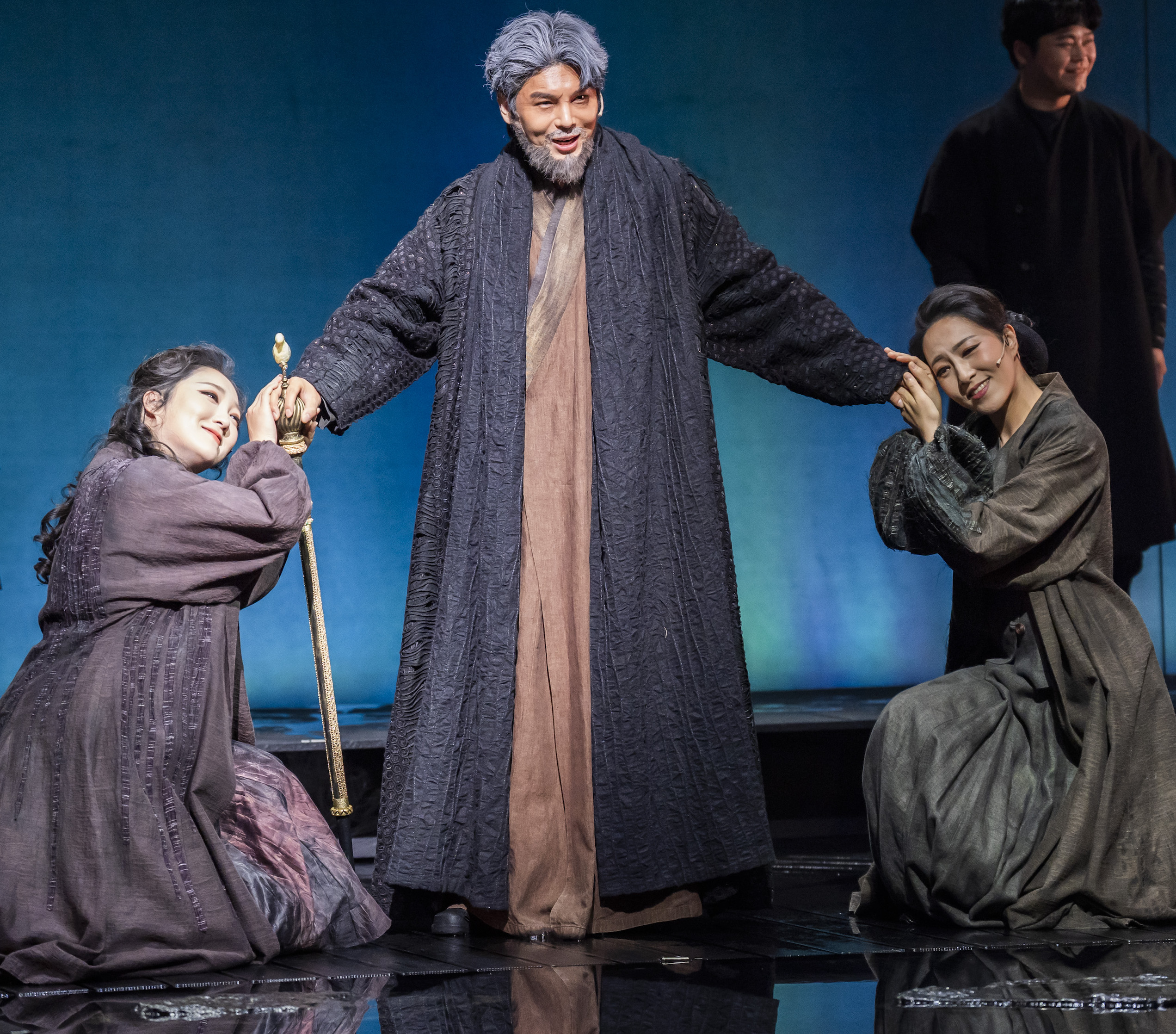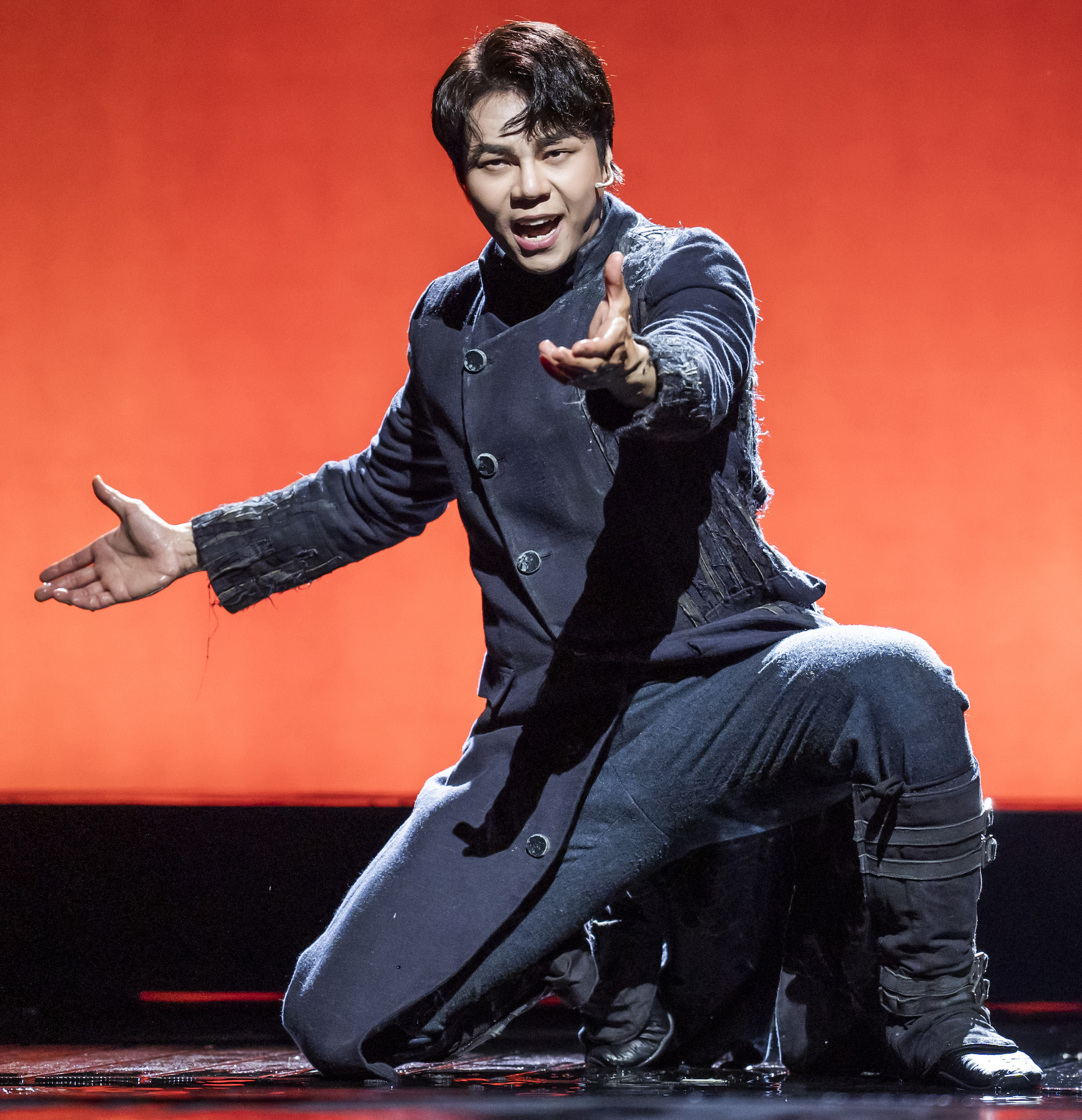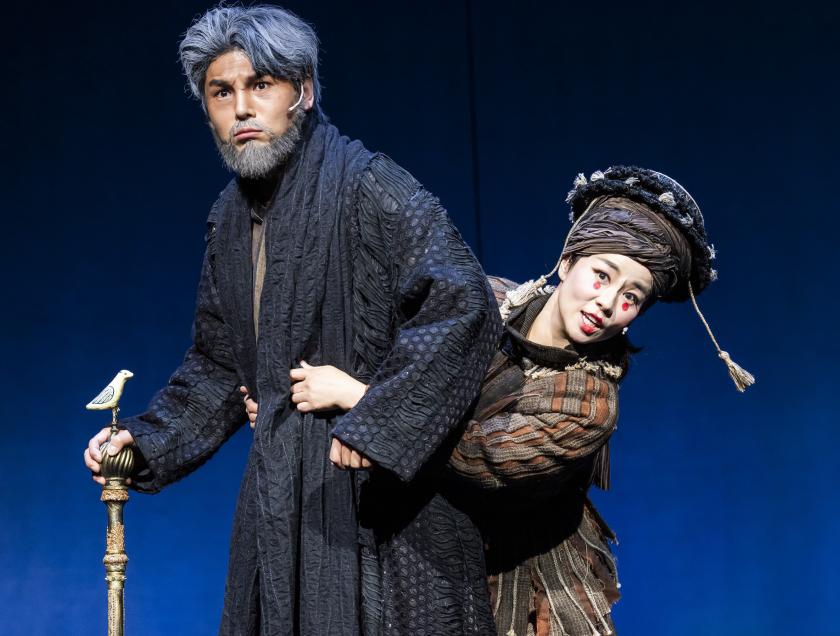What do the cult TV show Squid Game and National Changgeuk Company of Korea’s Lear have in common? Oddly, a K-Pop producer, Jung Jae-il, who has created additional music for Lear.
Korean opera traditionally tells its stories via a hybrid blend of singing, speech and movement (Pansori), and it’s unlike anything most Western audiences have heard before. The vocals are projected with intense passion, though have various kinds of ornamentation that sound, to the uninitiated (including me), like catches in the voice, exaggerated rubato or a subdued kind of yodelling. One of the style's leading practitioners is the company’s Lear, Kim Jun-su, a mere 33-year-old who bends himself into an 80-year-old shape.
This Lear, though, is an attempt to broaden the audience for the Pansori genre. It’s accompanied by a mix of traditional and modern instruments – a bamboo oboe and flute alongside a synthesiser – providing evocative incidental music of a winning simplicity, as well as backing for the stirring solos. Kitted out in dark tunics with large hoods, the soloists can also anonymously join the chorus to give their songs extra heft.
 The chorus here are key in giving the piece a framework of imagery that sits alongside elements from Shakespeare’s text (the adaptation is by Pai Sam-shik, translated into modern English). They sing of a big river, which is an embodiment of Lear, an idea picked up in song by the king himself, who sees his retirement as like the flow of a river to lower places it wouldn’t normally go to. The image is then given an unctuous spin by Goneril (Yi So Yeon) and Regan (Wang Yun-jeong, pictured above with Jun-su and Yi So Seun), who portray themselves as streams feeding into the river, lanterns to guide his boat. Princess Cordelia (Min Eun-kyung), of course, says merely that she loves her father, when asked, and nothing more.
The chorus here are key in giving the piece a framework of imagery that sits alongside elements from Shakespeare’s text (the adaptation is by Pai Sam-shik, translated into modern English). They sing of a big river, which is an embodiment of Lear, an idea picked up in song by the king himself, who sees his retirement as like the flow of a river to lower places it wouldn’t normally go to. The image is then given an unctuous spin by Goneril (Yi So Yeon) and Regan (Wang Yun-jeong, pictured above with Jun-su and Yi So Seun), who portray themselves as streams feeding into the river, lanterns to guide his boat. Princess Cordelia (Min Eun-kyung), of course, says merely that she loves her father, when asked, and nothing more.
The other important image is the sun – of which there can be only one. Edmund (Kim Su-in, pictured below), the bastard son of Gloucester, wants to be this prime force, unchallenged. Lear, he claims, has foolishly tried to create more than one sun in dividing up his kingdom and sharing it out. Edmund is costumed in a quasi military greatcoat, whereas Gloucester’s heir, Edgar (Lee Kwang-bok), is dressed in looser, more relaxed clothing, underlining his confidence in his status.
Shakespeare’s plot is essentially the one we know, barring small tweaks to the fates of the characters, Kent being renamed A Knight, Cordelia’s husband France becoming a no-show. There are echoes of Shakespeare’s text but in simplified form: “Poor Tom’s a-cold” becomes “It’s the cold I can’t endure”, for example; “unaccommodated man… a poor, bare, forked animal” doesn’t make it in, but “Naked we come into the world” does. As does the prime Elizabethan notion of Fate being a spinning wheel.
What registers strongly, though, is the noisy turbulence of the original, the disruption of nature created by Lear’s unnatural actions. For the storm scene, the drumming becomes thunderous, cymbals clash and the superb lighting simulates lightning strikes. It then becomes murky when Goneril’s army fights Cordelia’s, occasional flashes lighting up the two sides as they spar in swathes of grey smoke.
The staging also uses water with great skill. The trickle of the slow-moving river across the rocks onstage in the opening scene magically grows in volume as the river that is Lear becomes swollen by madness. By the climactic battle scene it is ankle deep. Lear at one point in the heath scenes catches a fish in it, which he studies, noting its empty round eyes, a “blank death”: an image that will return to haunt him. Then the water shrinks back for the very last tableau, the madness over.
 An interesting decision by director-choreographer Jung Young-doo echoes what Shakespeare is assumed by many scholars to have done, which is to double up the parts of Cordelia and the Fool for the same actress. Kim Eun-kyung assumes both strikingly, though Cordelia here is not centre-stage as much as the Fool is, a jaunty figure in what look like 16th century breeches and jerkin, capering and quipping. She is carried on by Lear near the end of the first half, then returns the favour by putting him on her back.
An interesting decision by director-choreographer Jung Young-doo echoes what Shakespeare is assumed by many scholars to have done, which is to double up the parts of Cordelia and the Fool for the same actress. Kim Eun-kyung assumes both strikingly, though Cordelia here is not centre-stage as much as the Fool is, a jaunty figure in what look like 16th century breeches and jerkin, capering and quipping. She is carried on by Lear near the end of the first half, then returns the favour by putting him on her back.
The declamatory style of the piece doesn’t encourage too much subtlety, by Western standards, in the actors’ delivery, but the cast aren’t limited by this. Goneril and Regan are impressively vicious without being cartoonish, like human equivalents of Rossini’s duet for rivalrous cats. They predictably overshadow their husbands with ease, Cornwall a pompous bully and Albany a peaceable man with a bird on his shoulder who wants to live a quiet and solitary life away from all the upheaval. Gloucester (Yu Tae Pyung Yang) is an affable but foolish father who finds nobility in his end; Edgar is a brave, princely man, though with a touch of Prince Hal is his talent to hide behind a different identity.
The impact of the evening for me was more in its stagecraft – the performers’ impressive skills and the striking staging – than in the usual pathos of the text. Its songs are forceful rather than moving, its action more like an epic poem’s than a nuanced drama’s. I enjoyed the bursts of dancing and wanted much more of it. Once my ears were tuned to this new frequency, it became a fascinating immersion in an almost-but-not-quite familiar theatrical world.















Add comment